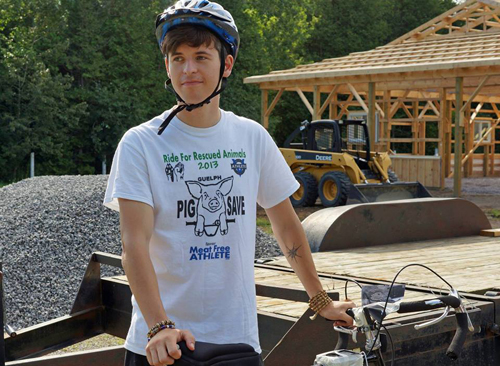
If only they could talk, what would animals say to us? What would they ask from us?
U of G grad student Michael Nicholson believes in social justice, not just for people but for animals. He’s working on a master’s degree in criminology and says: “Sometimes people see animals as inferior to humans. I disagree. They are different from us, but that doesn’t make them inferior. It does make them vulnerable and in need of our help.”
By being active in the Guelph Students for the Ethical Treatment of Animals (GSETA) club, Nicholson feels he has an opportunity to speak up for the animals, since they often can’t speak for themselves.
GSETA is one of more than 100 student clubs and groups accredited by U of G’s Central Student Association, which hosts a Club Days event at the beginning of each semester to introduce students to the variety of interest groups available to them.
For Nicholson, participation in GSETA goes hand-in-hand with his preference for veganism. He says he became vegetarian, then vegan, after seeing some videos about the lives of animals raised for food. “The reality was very different from the way the food industry portrays it,” he says. “I did my research and learned how healthy a vegan diet can be – no animal has to suffer or die so that I can eat well.”
He is involved in organizing a conference in Guelph on Oct. 26 that’s titled “Human Rights are Animal Rights.” It will include speakers who campaign on a variety of issues: women’s rights, queer rights, racism and ableism as well as animal rights. “Our goal is to bring all these concerns together and not compartmentalize them,” he says.
In past years, GSETA has hosted an anti-fur event to protest the exploitation of fur-bearing animals and brought in speakers including Canadian photojournalist Jo-Anne McArthur and Gene Baur of the Farm Sanctuary in New York. The club also hosts vegan potluck events during the year to demonstrate nutritious food made without animal products. Another project asks students to go vegan or vegetarian for a week and offers a chance to win prizes for those who make the change.
“A big part of what we do is share information with students. We will have movie nights, for example. For many, this is information they have never heard before,” says Nicholson. This year they plan to show Project Nim about a chimpanzee taken from his mother at two weeks old and placed with a human family as an experiment – one that doesn’t turn out well for the chimp.
The group also tries to organize an annual trip to a farm sanctuary.
At times, being a U of G student committed to animal rights is challenging for Nicholson. “The U of G has a long history of being involved in the exploitation of animals,” he says. “As well as making people aware of the issues, we want to provide resources to the people who are in these programs and look for valid and scientifically acceptable alternatives. We feel compassion for everyone involved, as well as the animals. We are all victims of the ideology and economy of the situation.”
Nicholson says the U of G club is not connected with People for the Ethical Treatment of Animals (PETA), but he and other GSETA members belong to local organizations that are involved in more activism. For example, he is part of Guelph Pig Save, a group that holds vigils at a slaughterhouse where pigs are killed. Similar groups exist to protest the slaughter of cows and chickens and the use of animals in testing.
Nicholson acknowledges that he found it traumatic when he first learned about the experiences of animals used in food, research and other areas. “Now, though, I feel very positive about being involved in GSETA and the other groups,” he says. “Our membership grows every year, and we have information to share with other people who might join with us to find more ways to help. I am optimistic that things are changing.”